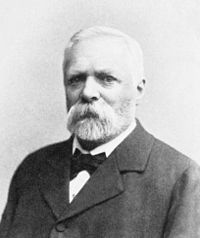Carl von Voit | |
|---|---|
 Carl von Voit | |
| Born | 31 October 1831 |
| Died | 31 January 1908 (aged 76) |
| Nationality | German |
| Alma mater | University of Munich |
| Known for | dietetics |
| Scientific career | |
| Fields | physiology |
Carl von Voit (31 October 1831 – 31 January 1908) was a German physiologist and dietitian.
Voit was born in Amberg, the son of August von Voit and Mathilde Burgett. From 1848 to 1854 he studied at the universities of Munich and Würzburg. At Munich, his teachers were Justus von Liebig and Max Joseph Pettenkofer, and at Würzburg, he was a pupil of Albert von Kölliker. In 1855 he furthered his education at the University of Göttingen under chemist Friedrich Wohler, and in 1856/57 served as an assistant to Theodor von Bischoff in Munich. In 1857, he obtained his habilitation, and from 1863 was a full professor of physiology, as well as curator of the physiological collection at the University of Munich.[1]
Carl von Voit is considered by many to be the "father" of modern dietetics. As a chemist and physiologist, he found that the amount of nitrogen in excreted urea is a measure for the protein turnover. Using a respiration chamber, he could characterize the significance of individual nutrients, known as Voitsche Kostmaß.
He was also a successful teacher, attracting international students to the University of Munich and thus significantly influencing the US nutritionist, among others. One of his better known German pupils was Max Rubner.
Carl von Voit died in Munich.
The German Nutrition Society has been awarding the Carl-von-Voit-medal since 1961.